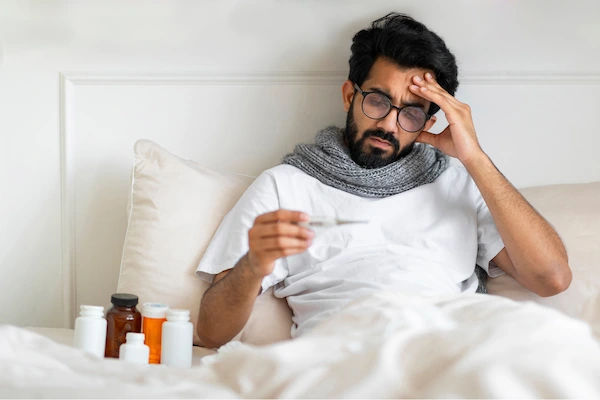Mental Health Care During Lockdown: A Practical Guide
Learn effective strategies to maintain mental health and well-being during lockdowns with practical tips and support.

Written by Dr. Dhankecha Mayank Dineshbhai
Reviewed by Dr. M L Ezhilarasan MBBS
Last updated on 13th Jan, 2026

Introduction
Lockdowns, while crucial for physical health, can feel like an emotional rollercoaster. The sudden disruption of routine, the lack of social contact, and the constant undercurrent of uncertainty create a perfect storm for stress, anxiety, and loneliness. If you've found yourself feeling overwhelmed, irritable, or just "off," you are far from alone. Taking proactive care of your mental health during these times isn't a luxury; it's an essential act of survival and well-being. This guide is designed to be your comprehensive companion, offering practical, actionable strategies to help you navigate this challenging period. We will move beyond generic advice, delving into the "why" behind your feelings and providing a structured toolkit to build resilience, maintain connection, and recognise when it might be time to seek extra support. Let's embark on this journey to safeguard your inner peace together.
Understanding the Lockdown's Impact on Your Mind
Before we can effectively address a problem, we must understand it. The psychological strain of a lockdown is not a sign of weakness; it's a natural human response to abnormal circumstances. Our brains are wired for predictability and social connection, both of which are severely disrupted.
Why Isolation Feels So Heavy: The Psychology Explained
Humans are inherently social creatures. Social interaction provides us with a sense of belonging, security, and purpose. A study published in The Lancet highlighted that periods of quarantine are frequently associated with post-traumatic stress symptoms, confusion, and anger. This is because isolation triggers our brain's threat response. The lack of casual chats, physical touch, and shared experiences can lead to feelings of loneliness, which are strongly linked to increased levels of the stress hormone cortisol. Understanding that this heaviness is a physiological and psychological reaction, not a personal failing, is the first step toward managing it with compassion.
Common Emotional Responses: It's Okay Not to Be Okay
You might experience a wide range of emotions, sometimes all in one day. This is normal. Common responses include:
- Anxiety and Worry: About health, finances, and the future.
- Sadness and Grief: For lost experiences, routines, and a sense of normalcy.
- Irritability and Anger: Frustration with the situation or those you are locked down with.
- Lethargy and Apathy: Finding it hard to motivate yourself.
- Sleep Disturbances: Difficulty falling asleep, staying asleep, or sleeping too much.
- Acknowledging these feelings without judgment is crucial. They are signals, not sentences.
Consult a Psychologist for the best advice
Building Your Daily Mental Health Toolkit
A toolkit contains practical items you can use every day. Your mental health toolkit should be no different. Here are foundational elements to incorporate.
The Non-Negotiable: Crafting a Structured Daily Routine
When the external world feels chaotic, creating internal structure is empowering. A routine provides a sense of normalcy and control. Your schedule doesn't need to be military-strict, but it should include anchor points:
- Set a consistent wake-up and bedtime to regulate your body clock.
- Dress for the day, even if you're not going out. This signals a shift from "rest mode" to "active mode."
- Schedule breaks, meals, work blocks, and leisure time.
This simple act of creating a daily routine for better mental health can significantly reduce decision fatigue and free up mental energy.
Move Your Body, Calm Your Mind: The Exercise Connection
Physical activity is a potent antidote to stress. Exercise releases endorphins, which are natural mood lifters, and helps metabolise excess stress hormones like cortisol and adrenaline. You don't need a home gym; a 20-minute online yoga session, a brisk walk in a safe area, or even dancing to your favorite music in the living room can work wonders. The goal is to get your heart rate up and shift your focus away from cyclical worries. Regular movement is a cornerstone of effective stress management.
Mastering the News Cycle: How to Stay Informed, Not Overwhelmed
While staying informed is important, constant exposure to alarming headlines is a recipe for anxiety. This is a key part of coping with loneliness in lockdown, as doomscrolling can make you feel even more isolated and helpless.
- Designate specific times for checking news (e.g., once in the morning and once in the evening).
- Curate your sources. Stick to reputable, fact-based organisations and avoid sensationalist media or unverified social media feeds.
- Set a time limit. Give yourself 15-20 minutes for your news check-in, then close the app.
The Power of Connection in a Physically Distant World
"Social distancing" should really be called "physical distancing." Maintaining social connection is more important than ever for our emotional well-being.
Quality Over Quantity: Making Virtual Interactions Meaningful
A back-to-back schedule of video calls can lead to "Zoom fatigue." Focus on quality. Instead of superficial chats, schedule a virtual coffee where you talk about feelings, watch a movie together using streaming party features, or join an online book club. Meaningful interaction, even through a screen, can release oxytocin (the "bonding hormone") and counteract feelings of isolation.
Reaching Out: How to Ask for Help When You Need It
It can be hard to admit we're struggling. Remember, vulnerability is a strength. If you're feeling low, message a friend and say, "I'm having a tough day, can we talk?" Most people are eager to help but don't know how to offer. By being specific, you make it easier for them to support you. This is a vital skill for improving mental wellness during quarantine.
Advanced Self-Care: Beyond the Basics
Once you have the fundamentals in place, you can explore practices that deepen your resilience.
Mindfulness and Meditation for Beginners
Mindfulness is the practice of anchoring yourself in the present moment without judgment. It's a powerful tool to break the cycle of anxious "what-if" thinking about the future. Apps like Headspace or Calm offer excellent guided sessions for beginners. Start with just 5 minutes a day. Focus on your breath. When your mind wanders (which it will), gently guide it back. This practice builds the mental muscle of awareness.
Rediscovering Joy: The Importance of Hobbies and Play
When did you last do something just for the fun of it? Engaging in a hobby, whether it's painting, gardening, coding, or learning a new language, provides a sense of accomplishment and flow, a state where you're so absorbed you lose track of time. This is a form of play that is crucial for adult mental health, reducing stress and sparking creativity.
Improving Sleep Hygiene for Better Mental Resilience
Sleep and mental health are deeply intertwined. Poor sleep can exacerbate anxiety and depression. Improving sleep during stressful times is critical.
- Create a wind-down routine: An hour before bed, dim the lights, avoid screens, and read a book or listen to calm music.
- Keep your bedroom cool, dark, and quiet.
- Avoid caffeine and heavy meals close to bedtime.
If your condition does not improve after trying these methods, it may be helpful to speak with a professional.
Recognising When to Seek Professional Support
Self-care strategies are powerful, but they have their limits. There is no shame in needing professional help; it is a sign of self-awareness and strength.
Red Flags: Signs Your Mental Health Needs More Attention
It's time to consider extra support if you experience:
- Persistent feelings of sadness, anxiety, or "emptiness" that last most of the day, nearly every day.
- Inability to function in daily life (work, self-care, relationships).
- Thoughts of harming yourself or others.
- Significant changes in appetite or weight.
- Relying on substances like alcohol to cope.
Your Options: From Teleconsulting to Traditional Therapy
Accessing help is easier than ever. Virtual therapy options have become mainstream. You can have secure video sessions with licensed psychologists and psychiatrists from the comfort of your home. Platforms like Apollo24|7 offer easy access to these professionals. For some, in-person therapy may be preferred, and many clinics now follow strict safety protocols.
Conclusion
Navigating a lockdown is a marathon, not a sprint. Taking care of your mental health requires consistent, compassionate effort. By understanding the psychological impact, building a practical daily toolkit, fostering genuine connections, and knowing when to seek support, you can not only survive this period but also build lasting resilience. Remember, it's about progress, not perfection. Some days will be better than others, and that's perfectly okay. Be kind to yourself. You are navigating uncharted territory. Start today by implementing just one or two strategies from this guide, and gradually build from there. Your mind is your most valuable asset; invest in it wisely.
Consult a Psychologist for the best advice
Consult a Psychologist for the best advice

Ms Rajashree Navthale
Psychotherapy & Counselling (ASM)
8 Years • MA in Counselling & Psychotherapy, PG Diploma in Counselling & Psychotherapy.
Akola
Connect Counselor, Akola

Miss. Vaishnavi Sankeshwar
Psychologist
5 Years • Msc Clinical Psychology
Bengaluru
Apollo Clinic, JP nagar, Bengaluru

Ms. Gunjan Arya
Psychologist
4 Years • MA Psychology
Delhi
Psych Therapy By Gunjan Arya, Delhi

Ms. Meenu Sharma
Psychologist
11 Years • PhD (Applied Psychology), MA (Applied Psychology),PG Diploma in Rehabilitation Psychology
Noida
Dr Meenu Sharma Clinic, Noida
(75+ Patients)

Ms. Sapna Zarwal
Psychologist
20 Years • Msc (Applied Psychology), Ph D ( Special Education)
Gurugram
SOOTHING ZEN, Gurugram
(25+ Patients)
Consult a Psychologist for the best advice

Ms Rajashree Navthale
Psychotherapy & Counselling (ASM)
8 Years • MA in Counselling & Psychotherapy, PG Diploma in Counselling & Psychotherapy.
Akola
Connect Counselor, Akola

Miss. Vaishnavi Sankeshwar
Psychologist
5 Years • Msc Clinical Psychology
Bengaluru
Apollo Clinic, JP nagar, Bengaluru

Ms. Gunjan Arya
Psychologist
4 Years • MA Psychology
Delhi
Psych Therapy By Gunjan Arya, Delhi

Ms. Meenu Sharma
Psychologist
11 Years • PhD (Applied Psychology), MA (Applied Psychology),PG Diploma in Rehabilitation Psychology
Noida
Dr Meenu Sharma Clinic, Noida
(75+ Patients)

Ms. Sapna Zarwal
Psychologist
20 Years • Msc (Applied Psychology), Ph D ( Special Education)
Gurugram
SOOTHING ZEN, Gurugram
(25+ Patients)
More articles from General Medical Consultation
Frequently Asked Questions
I feel guilty for struggling when others have it worse. Is this normal?
Yes, this is a very common feeling known as 'comparative suffering.' However, your pain is valid regardless of others' circumstances. Acknowledging your own struggle is not dismissing others'; it's allowing yourself the space to heal so you can be more present for yourself and others.
What are some quick anxiety-relief techniques I can use anytime?
The '5-4-3-2-1' grounding technique is highly effective. Acknowledge 5 things you can see, 4 things you can feel, 3 things you can hear, 2 things you can smell, and 1 thing you can taste. This forces your brain to focus on the present moment, breaking the cycle of anxious thoughts.
How can I help a family member who seems to be struggling but won't talk about it?
Don't pressure them. Instead, offer gentle, non-judgmental support. You could say, 'I've noticed you seem a bit quiet lately, and I'm here for you if you want to talk.' Lead by example by sharing your own feelings sometimes. Sometimes, just spending quiet time together can be comforting.
Is it possible to develop depression during a lockdown?
Yes, the stress, isolation, and disruption caused by lockdowns are significant risk factors for developing depression. If you experience persistent low mood, loss of interest in activities, and changes in sleep or appetite for more than two weeks, it is important to seek professional advice.
Are online therapy sessions as effective as in-person ones?
Numerous studies have shown that telepsychology and online therapy can be just as effective as face-to-face sessions for many common conditions like anxiety and depression. The key factor is the therapeutic alliance between you and the therapist, which can be successfully built online.


.jpg)

